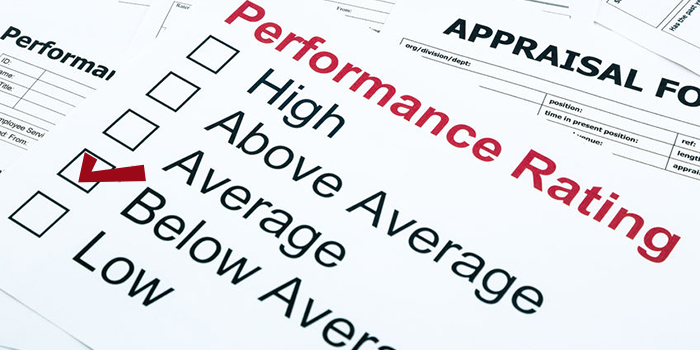 End of year is performance review time. The process can take months but the actual delivery is often swift and blunt. What happens when the news is negative, a poor performance review, or not what you expected?
End of year is performance review time. The process can take months but the actual delivery is often swift and blunt. What happens when the news is negative, a poor performance review, or not what you expected?
A less than stellar review can sometimes be the best thing that will ever happen to your career. It forces you to reassess your performance, goals, and aspirations. You wouldn’t be the first person to make a major change for the better in performance or location because of a negative review.
Steps to Take After a Poor Performance Review
Here are a few things, as an executive coach and former senior executive, I believe you might want to think about should you find yourself considering the results of a poor performance review.
- Control your public reaction and actions. Sure, you can fantasize standing up and yelling “take this job and… “ or walking out the door with a finger in the air but you may regret that now and in the future. Take a walk, throw some water in your face, breathe, and then give yourself time to weigh the best way to react and possible next steps.
- Clarify with the author. During the performance evaluation session, ask for specific examples or numbers that back up the comments. Probably not a good idea to nitpick your way through the document but getting some clear information may help you understand the message. Once you have some distance from the original delivery, go over the comments in detail by yourself.
-
Consider the message. Success-driven people are accustomed to doing well. “Meets expectations” or “Satisfactory” is like getting a “D” in school. But is it? What if you are new to a position and maybe it’s a bit of a stretch for you? Is the entire organization facing tough times and everyone is being held accountable? Did you have a misstep that is tainting your overall image? Is meeting your boss’s “never good enough” expectations, under these circumstances, really a failure?
The Likert type scales of rating, whether they are numbers (1-5) or descriptive phrases (exceeds expectations) are not the best way for many managers to communicate performance. Read the narrative that follows the rating before coming to any conclusions. Try to listen from the writer’s point of view. It often is more specific and enlightening.
Also, it’s sad to say but some people can’t praise. It’s not in their DNA. We’ve all worked with the supervisor who can never give a top score, to anyone. Take that into consideration when reading the feedback.
- Consultation not revelation. There should be nothing in your review that you do not know or have not been told. If there are shockers, ask yourself, “Was I in denial?” “Is my relationship with my supervisor such that we did not discuss his/her dissatisfaction?” “What is my role in this disconnect?” “Did I spend enough time on my self-evaluation to help my boss remember some of my contributions?”
- Concede there may be truth in the evaluation. Did you hit your targets? How did your direct reports perform? Have you turned a high number of valued staff? Did it have little to do with results and more with your attitude? Are you really not a member of the team? Is your critical thinking seen as negative or unsupportive? Is your behavior professional, trustworthy, and consistent with the company’s values? Were you distracted by personal issues? Did you support your boss and the boss’s boss? Have you brought new ideas to the table? Are your tech skills, job function skills, and knowledge competitive to others? How did you enhance the image of the organization internally and externally? Is it what you did or didn’t do that got you in this mess?
- Consult those you trust. It’s hard for any of us to be truly objective about our performance. Seek out the insights and suggestions of those you know, respect and trust. They could be a mentor, your executive coach, a trusted colleague, or former supervisor. You are not seeking agreement but another perspective, some advice and maybe a harsh dose of reality.
- Create an action plan. A well-written performance evaluation should have an action plan attached. If it does, read it carefully, ask questions and get moving. If you have not been given one, or to supplement the one designed by your boss, create your own immediately. List your goals, objectives, measurement, actions, and timeframes that will happen immediately and consistently. Get buy-in from your boss and schedule regular update meetings to assess progress. The quicker you show change or improvement, the faster you will lose the negatives.
- Contemplate your options. Short and long-term. Is this the wake-up call you needed? Are you bored, burned-out, or distracted? Does another department, division, or project seem more appealing? Are you and your supervisor a poor match? Is it time to shift into another gear and show them what you’ve got? Or is it time to move out and on? These are no simple questions. And certain options may not be available immediately but a weak performance evaluation can sometimes open opportunities and accelerate a decision or dream.
No one wants a poor or less than stellar performance evaluation, though it does come at some point in most people’s career. The secret is to be prepared with a strategy and action plan to listen, respond, and react, so the future looks the way you imagine.
For some case studies on just this subject go to Harvard Business Review’s “What to Do After a Bad Performance Review.”
To read another perspective on this topic go to Fortune’s “Can you correct a bad performance review?”
Leave a Reply